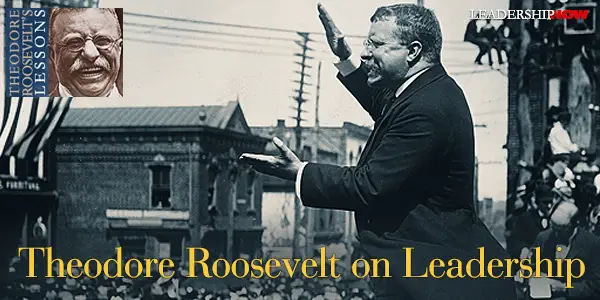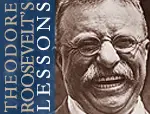10.26.18

Theodore Roosevelt on Leadership
 A
ALTHOUGH BORN INTO PRIVILEGE, Theodore Roosevelt’s life was not without struggles, tragedy, and failures. The way he dealt with these experiences, defined his leadership. He referred to life as “The Great Adventure.” He wrote in his Autobiography, “life is a great adventure, and the worst of all fears is the fear of living. There are many forms of success, many forms of triumph. But there is no other success that in any shape or way approaches that which is open to most of the many, many men and women who have the right ideals. These are the men and the women who see that it is the intimate and homely things that count most. They are the men and women who have the courage to strive for the happiness which comes only with labor and effort and self-sacrifice, and only to those whose joy in life springs in part from power of work and sense of duty.” TR lived life fully. He was the man in the arena.
Learning from the Past
- It is of little use for us to pay lip-loyalty to the mighty men of the past unless we sincerely endeavor to apply to the problems of the present precisely the qualities which in other crises enabled the men of that day to meet those crises.
(New Nationalism Speech, August 31, 1910)
- The problems differ from generation to generation, but the qualities that are needed to solve them remain unchanged from world's end to world's end…. As a nation and individually we must show the fundamental qualities of hardihood, courage, manliness, of decency, morality, clean living, fair dealing as between man and man, of common sense, the saving grace of common sense.
(Speech in Santa Barbara, California, May 9, 1903)
Work While You Work—Play While You Play
- No boy can afford to neglect his work, and with a boy work, as a rule, means study. I am no advocate of senseless and excessive cramming in studies, but a boy should work, and should work hard, at his lessons—in the first place, for the sake of what he will learn, and in the next place, for the sake of the effect upon his own character of resolutely settling down to learn it. Shiftlessness, slackness, indifference in studying, are almost certain to mean inability to get on in other walks of life. Of course, as a boy grows older it is a good thing if he can shape his studies in the direction toward which he has a natural bent; but whether he can do this or not, he must put his whole heart into them. I do not believe in mischief-doing in school hours, or in the kind of animal spirits that results in making bad scholars; and I believe that those boys who take part in rough, hard play outside of school will not find any need for horse-play in school. While they study they should study just as hard as they play foot-ball in a match game. It is wise to obey the homely old adage, "Work while you work; play while you play."
(The American Boy, May 1900)
Walk Your Talk
- Unless a man believes in applied morality he is certain to be merely a noxious public servant.
(The Higher life of American Cities, Outlook, Dec 21, 1895)
Character
- It is character that counts in a nation as in a man. It is a good thing to have a keen, fine intellectual development in a nation, to produce orators, artists, successful business men; but it is an infinitely greater thing to have those solid qualities which we group together under the name of character—sobriety, steadfastness, the sense of obligation toward one's neighbor and one's God, hard common sense, and, combined with it, the lift of generous enthusiasm toward whatever is right. These are the qualities which go to make up true national greatness.
(Grant, Speech Delivered At Galena, Illinois, April 27, 1900)
- I hope that in my acts I have been a good President, a President who has deserved well of the Republic; but most of all, I believe that whatever value my service may have, comes even more from what I am than from what I do.
(Letter to Sir George O. Trevelyan, June 19 1908)
- Unless a man is master of his soul, all other kinds of mastery amount to little.
(Ladies Home Journal, 1917)
- If a man does not have an ideal and try to live up to it, then he becomes a mean, base and sordid creature, no matter how successful.
(Letter to his son Kermit, 1915)
Take Action
- In every such crisis the temptation to indecision, to non-action, is great, for excuses can always be found for non-action, and action means risk and the certainty of blame to the man who acts. But if the man is worth his salt he will do his duty, he will give the people the benefit of the doubt, and act in any way which their interests demand and which is not affirmatively prohibited by law, unheeding the likelihood that he himself, when the crisis is over and the danger past, will be assailed for what he has done.
(Theodore Roosevelt: An Autobiography, 1913, Chapter 12)
- To sit home, read one's favorite paper, and scoff at the misdeeds of the men who do things is easy, but it is markedly ineffective. It is what evil men count upon the good men's doing.
(The Outlook, December 21, 1895)
- It is not the critic who counts; not the man who points out how the strong man stumbles, or where the doer of deeds could have done them better. The credit belongs to the man who is actually in the arena, whose face is marred by dust and sweat and blood; who strives valiantly; who errs, and comes short again and again, because there is no effort without error and shortcoming; but who does actually strive to do the deeds; who knows the great enthusiasms, the great devotions; who spends himself in a worthy cause; who at the best knows in the end the triumph of high achievement, and who at the worst, if he fails, at least fails while daring greatly, so that his place shall never be with those cold and timid souls who know neither victory nor defeat.
(Citizenship in a Republic, Address delivered at the Sorbonne, Paris, April 23, 1910)
Virtue
- No nation deserves to exist if it permits itself to lose the stern and virile virtues; and this without regard to whether the loss is due to the growth of a heartless and all-absorbing commercialism, to prolonged indulgence in luxury and soft, effortless ease, or to the deification of a warped and twisted sentimentality."
(Nobel Lecture, May 1910)
Back Your Words with Action
- The unforgivable crime is soft hitting. Do not hit at all if it can be avoided; but never hit softly."
(Practical Politics, April 1913)
Success
- It is a bad thing for a nation to raise and to admire a false standard of success; and there can be no falser standard than that set by the deification of material well-being in and for itself."
(Citizenship in a Republic, Address delivered at the Sorbonne, Paris, April 23, 1910)
- There are many kinds of success in life worth having. It is exceedingly interesting and attractive to be a successful business man, or railroad man, or farmer, or a successful lawyer or doctor; or a writer, or a President, or a ranchman, or the colonel of a fighting regiment, or to kill grizzly bears and lions. But for unflagging interest and enjoyment, a household of children, if things go reasonably well, certainly makes all other forms of success and achievement lose their importance by comparison. It may be true that he travels farthest who travels alone; but the goal thus reached is not worth reaching. And as for a life deliberately devoted to pleasure as an end — why, the greatest happiness is the happiness that comes as a by-product of striving to do what must be done, even though sorrow is met in the doing. There is a bit of homely philosophy, quoted by Squire Bill Widener, of Widener's Valley, Virginia, which sums up one's duty in life: "Do what you can, with what you've got, where you are."
(Theodore Roosevelt: An Autobiography, 1913, Chapter 9)
Face Your Fears
- There were all kinds of things of which I was afraid at first, ranging from grizzly bears to "mean" horses and gun-fighters; but by acting as if I was not afraid I gradually ceased to be afraid. Most men can have the same experience if they choose.
(Theodore Roosevelt: An Autobiography, 1913, Chapter 2)
Work Hard
- Nothing in this world is worth having or worth doing unless it means effort, pain, difficulty.
(American Ideals in Education, 1910)
- I don't pity any man who does hard work worth doing. I admire him. I pity the creature who does not work, at whichever end of the social scale he may regard himself as being.
(Speech, September 8, 1902)
- Greatness means strife for nation and man alike. A soft, easy life is not worth living, if it impairs the fibre of brain and heart and muscle. We must dare to be great; and we must realize that greatness is the fruit of toil and sacrifice and high courage... We are face to face with our destiny and we must meet it with a high and resolute courage. For us is the life of action, of strenuous performance of duty; let us live in the harness, striving mightily; let us rather run the risk of wearing out than rusting out.
(Address at the opening of the gubernatorial campaign, New York City, 5 October 5, 1898)
What Matters
- Home, wife, and children—they are what really count in life. I have enjoyed many things; the Presidency, my success as a soldier, a writer, a big game hunter and explorer; but all of them put together are not for one moment to be weighed in the balance when compared with the joy I have known with your mother and all of you.
(Letter to his son Ted, Jr.)
* * *
Further Reading:
 The Strenuous Life The Strenuous Life
 Character & Success Character & Success
 The American Boy The American Boy
 The Leader and the Cause The Leader and the Cause
 Citizenship in a Republic Citizenship in a Republic (The Man in the Arena)
Of Related Interest:
 Theodore Roosevelt’s The Man in the Arena Speech 100th Anniversary Theodore Roosevelt’s The Man in the Arena Speech 100th Anniversary
 The Making of Theodore Roosevelt The Making of Theodore Roosevelt
 Leadership in Turbulent Times Leadership in Turbulent Times
* * *  Like us on Instagram and Facebook for additional leadership and personal development ideas.
Posted by Michael McKinney at 10:28 AM
Permalink
| Comments (1)
| This post is about Leaders
|
 |
BUILD YOUR KNOWLEDGE
ADVERTISE WITH US






How to Do Your Start-Up Right
STRAIGHT TALK FOR START-UPS



Grow Your Leadership Skills
NEW AND UPCOMING LEADERSHIP BOOKS

Leadership Minute
BITE-SIZE CONCEPTS YOU CAN CHEW ON

Classic Leadership Books
BOOKS TO READ BEFORE YOU LEAD
|
 |
|










